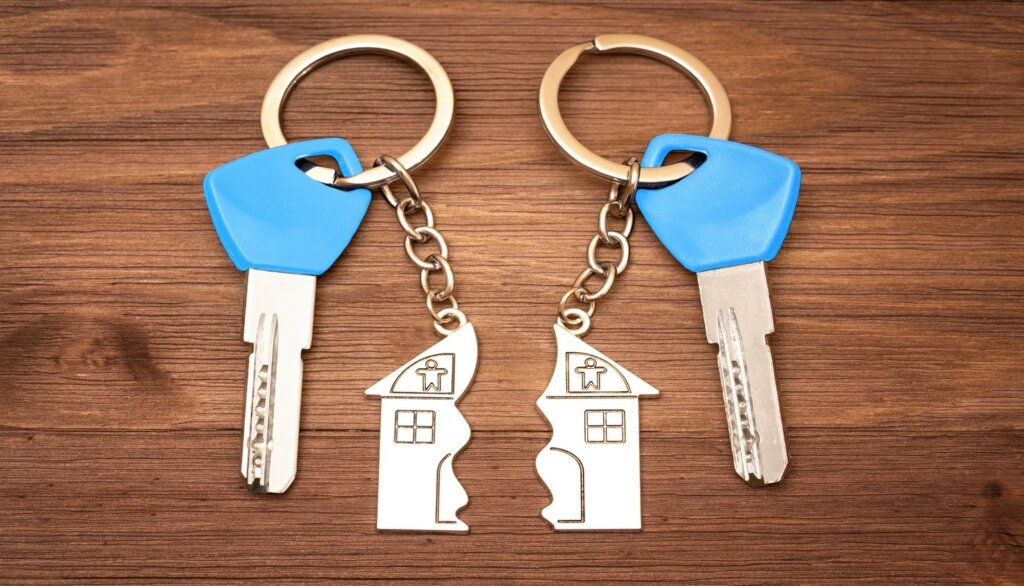Introduction
If you’re reading this, you might be experiencing the emotional and financial stress of a divorce, and you likely feel overwhelmed by the decisions you have to make—one of which is how to handle your shared property. You might be wondering whether it’s better to sell the house, buy out your spouse, or try to manage the house while navigating the emotional toll of this life change. Divorce proceedings are challenging enough without the added burden of worrying about your house. It’s common to feel uncertain about the next steps, especially when you’re faced with choosing the best way to sell your house quickly and efficiently in Washington.
You want clarity on the advantages of selling your house during a divorce, but also on the challenges that might arise in the process. How do you ensure you sell your home for the best possible price? What costs will you face? And how long will the process take? All of these questions, along with fears of financial strain and delays in finalizing the divorce, may be clouding your decision-making. This blog will help address all these concerns, guide you through the process, and provide insight into why selling to a cash buyer could be the best solution.
Selling Your Home During Divorce in Washington

Selling your home during a divorce is a decision that needs to be made with careful consideration, especially in Washington. The state has specific laws that impact how marital property is divided. This includes any real estate you and your spouse own. Divorce can be a long and stressful process, and adding the sale of a home to the equation can further complicate things. Whether you’re looking to sell the home quickly or want to take your time to get the best deal, it’s crucial to understand how to approach this step effectively.
In this post, we’ll explore the best ways to sell your house during a divorce in Washington, including the pros and cons of different selling options. We will also dive into why working with cash buyers could simplify the process and ensure you get the financial freedom you need. Keep reading to learn more about your options and how you can make the process as smooth as possible.
Why Sell Your House During a Divorce?
One of the first things you might wonder is why selling your house during a divorce is the best option. The idea of keeping the house can seem appealing at first, especially if you have children or strong emotional ties to the home. However, there are several reasons why selling the property during the divorce process might be the wisest financial decision.
Financial Considerations
In a divorce, your home is typically considered part of the marital assets that need to be divided. Selling the house provides both spouses with an equal opportunity to walk away with their fair share of the proceeds. In Washington, property division is generally based on community property laws, meaning the house (if purchased during the marriage) will be considered joint property. Selling the house means you can liquidate the asset and divide the profits equally, which can give you both the financial stability you need to start fresh post-divorce.
Emotional Benefits
It can also be emotionally difficult to continue living in a house that holds so many memories from the marriage. Selling the house allows both parties to emotionally detach from the home and move forward with their lives. For some, the thought of continuing to live in the same place where the marriage fell apart is overwhelming, making selling the home an essential step in healing.
Costs of Keeping the House
While keeping the house might seem like a stable option, the costs can be substantial. Mortgage payments, property taxes, insurance, and maintenance expenses can quickly add up, especially when managing those costs on a single income. Additionally, if one spouse wants to remain in the house and is unable to buy out the other spouse, the cost of continuing to maintain the home may not be sustainable.
For more guidance on how to manage finances during a divorce, check out Comerica Bank’s Financial Tips.
Potential Delays in Divorce Proceedings
Trying to negotiate the sale of the home during the divorce process can lead to delays in finalizing the divorce. If both parties are emotionally attached to the home or if one spouse is hesitant to sell, this can drag out the divorce and prolong the financial uncertainty. In such cases, selling the house can help expedite the divorce and provide both parties with a sense of closure.
Selling Your Home During a Divorce in Vancouver could be a resource that helps you understand the intricacies of the divorce process in specific areas of Washington. The article provides localized information that can offer insights into the legal steps and considerations of selling a home in the Vancouver area during divorce proceedings.
How To Sell Your House During Divorce in Washington

Selling your home during a divorce requires navigating legal, emotional, and financial aspects. To sell successfully, you need to follow the right steps to ensure everything proceeds smoothly. Here are the key steps to keep in mind:
1. Determine Who Gets the Home
Before you can sell the property, you and your spouse will need to come to an agreement on who gets the home. In some cases, one spouse may want to stay in the house while the other buys them out. In other cases, both parties may agree that selling the home and dividing the proceeds is the best solution.
2. Understand the Market Conditions
The real estate market in Washington can vary widely depending on the location, such as Seattle, Spokane, or Tacoma. If the market is hot, selling your house quickly could be a good decision. However, if the market is slow, it may take longer to get the best price for your home. It’s important to work with a local real estate agent who can assess the current market conditions and help you set a fair price.
For more information on understanding local real estate conditions in Washington, refer to Zillow’s Real Estate Market Analysis.
3. Prepare the Home for Sale
Whether you are selling your home to a traditional buyer or a cash buyer, preparing the property for sale is essential. This might involve making repairs, cleaning, and staging the home to make it as appealing as possible. However, keep in mind that this can be a time-consuming process, and in some cases, divorcees may not want to invest money or effort into these repairs.
4. Consider Your Options: Traditional Sale vs. Cash Sale
A traditional sale involves listing your home with a real estate agent, holding showings, and waiting for an offer. While this may work for some, the process can be long, stressful, and costly. Additionally, if the house is in need of repairs, this could scare off potential buyers or force you to lower the price.
On the other hand, selling to a cash buyer offers significant advantages. Cash sales eliminate the need for showings, negotiations, or dealing with lenders, speeding up the process. This can be especially helpful during a divorce, where the focus is on getting the house sold quickly and fairly. Cash buyers also typically purchase homes as-is, meaning you don’t have to worry about making expensive repairs or renovations.
You might be thinking about how long your house will take to sell during a divorce. For example, What If My House Won’t Sell During A Divorce in Kelso WA? is a common concern. In this case, turning to a cash buyer may be the best solution to avoid a prolonged and costly sale process.
The Legal Aspects of Selling Your Home During Divorce in Washington
Divorce involves legal considerations, especially when it comes to property division. In Washington, which follows community property laws, the house you and your spouse own is generally considered marital property. This means that the home must be divided as part of the divorce settlement. Understanding the legal requirements of selling your home during a divorce in Washington is crucial.
Property Division in Divorce
Before you list your home, it’s important to understand how the property will be divided. Washington law requires that assets be split fairly, but not necessarily equally. This means that while one spouse might want to keep the house, the other might prefer to sell it and divide the proceeds. If the home is sold, both spouses must agree on the sale price and division of the proceeds. Any disagreements can result in delays in the divorce process.
Getting Legal Advice
Working with a family law attorney is essential during a divorce, especially when it comes to selling the house. Your attorney can help you navigate the complexities of property division and ensure that the sale proceeds align with your divorce agreement. This can prevent potential legal issues from arising later on.
Selling the house can often be one of the most contentious parts of a divorce. Therefore, understanding your legal rights, as well as the best way to divide the proceeds, is crucial. In some cases, a judge may need to step in to approve the sale price and distribution of the funds.
Should You Sell or Buy Out Your Spouse’s Share?
One of the key decisions in the divorce process is whether you should sell the home or buy out your spouse’s share. This decision depends on multiple factors, including your finances, emotional attachment to the home, and long-term goals. Here’s a breakdown of both options:
Selling the Home
Selling the home is often the most straightforward choice, particularly if both parties are ready to move on. Dividing the proceeds can help provide each spouse with the financial means to move forward independently. If you’re struggling with the idea of buying out your spouse’s share or simply don’t want to be tied to the property any longer, selling is usually the best option.
Buying Out Your Spouse
If you have the financial means to do so, you might consider buying out your spouse’s share of the home. This can allow you to stay in the house and avoid the hassle of moving. However, this option requires that you have enough money to pay your spouse’s share, and you must be able to handle the mortgage and maintenance costs on your own moving forward.
Before making this decision, it’s important to weigh the pros and cons. For many, the financial strain of keeping the house long-term after a divorce may outweigh the emotional desire to stay in it.
The Role of a Real Estate Agent vs. a Cash Buyer in Divorce Sales
When selling a home during a divorce, you might wonder whether you should work with a traditional real estate agent or opt for a cash buyer. Both options come with their advantages, but one may suit your needs better depending on your situation.
The Traditional Real Estate Agent
A real estate agent can help you market the home to a broader audience. They will guide you through the process of listing the property, showing it to potential buyers, negotiating offers, and dealing with paperwork. However, selling with a realtor can take time, often several months. Additionally, agent fees (usually 5-6% of the sale price) can eat into the profits from the sale, reducing the amount you walk away with.
Real estate agents can also help navigate any emotional concerns about the home by providing a professional perspective on pricing and market trends. However, if time is of the essence during a divorce, the long wait may not be ideal.
The Cash Buyer
A cash buyer, on the other hand, offers a more streamlined process. Selling to a cash buyer eliminates the need for repairs, open houses, and waiting for buyer financing to come through. The sale can be completed quickly—often within a couple of weeks—helping to expedite the divorce settlement. Additionally, with cash buyers, there are no commissions or agent fees, allowing you to keep more of the sale proceeds.
Selling to a cash buyer can be particularly beneficial if you’re looking to sell the house as-is, without putting money into repairs or renovations. However, you may receive a lower offer than you would with a traditional sale, as cash buyers typically purchase homes at a discount to account for the speed and ease of the transaction.
Advantages of Selling to a Cash Buyer
One of the most significant benefits of selling your house during a divorce to a cash buyer is the speed and ease of the transaction. Cash buyers don’t require financing, which eliminates the need for lengthy approval processes and potential delays.
Quick Closing
With a cash buyer, the closing process can happen in as little as 7-14 days. This is particularly helpful in a divorce, where both parties might want to finalize the division of assets as quickly as possible. This fast closing timeline can help reduce stress and speed up the financial settlement.
Avoiding Repairs and Renovations
Many people facing divorce do not have the time, money, or energy to fix up their home before selling. A cash buyer will often purchase the house as-is, meaning you don’t have to make costly repairs or deal with complicated negotiations about condition. This can be a huge relief during a divorce, when you may already be juggling numerous other responsibilities.
No Realtor Fees
When you sell traditionally, you have to pay agent commissions, which can range from 5% to 6% of the sale price. Selling to a cash buyer eliminates this cost, meaning you can keep more of the proceeds from the sale.
Challenges of Selling During Divorce
While selling your home during a divorce offers numerous benefits, it’s not without its challenges. There are several pitfalls that you should be aware of to avoid further complications:
Emotional Challenges
Divorce is an emotionally charged process, and selling the home can sometimes make things feel even more difficult. One or both spouses may have strong emotional attachments to the property, which can make negotiations tense. In some cases, one spouse may be resistant to selling, even if it’s the best financial option.
Dividing the Proceeds
Once the home is sold, the proceeds must be divided between both parties. This can be a point of contention, especially if there are disagreements over the sale price or how to divide the proceeds. Working with an attorney to ensure the process is handled equitably is crucial.
Potential for Delays
If you opt for a traditional sale, delays are possible. Buyers may back out, financing may fall through, or the closing process can be prolonged. These delays can be particularly stressful during a divorce, as they may delay the finalization of your financial separation.
If you’re dealing with these challenges, consider the alternative of Selling Your House in Longview WA While Divorcing. A cash buyer can bypass these issues, providing a much faster and smoother selling experience.
Conclusion: Why Selling to PineCone Properties is Your Best Option
In conclusion, selling your house during a divorce in Washington can be an emotionally challenging and financially complicated process. While traditional sales may seem appealing at first, they often come with delays, costly repairs, and a lengthy waiting period. In contrast, selling to a cash buyer, like PineCone Properties, offers a much simpler and quicker solution.
By working with PineCone Properties, you can bypass the long process of listing, showings, and negotiations. We offer a fast, as-is sale, meaning you don’t have to worry about costly repairs or making your home look perfect. Plus, with no agent commissions or closing costs, you keep more of the proceeds. Our goal is to help you close the deal quickly so you can move on from the stress of the divorce and start fresh financially.
If you’re ready to sell your house during a divorce and need a fast, hassle-free solution, PineCone Properties is here to make the process smooth and efficient. Let us help you through this difficult time with a fair cash offer and a quick closing.

